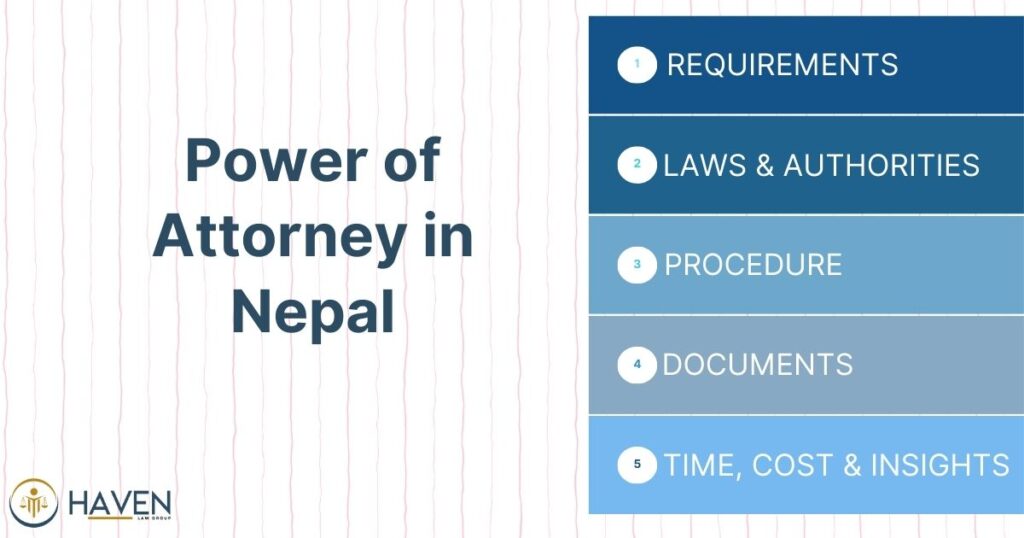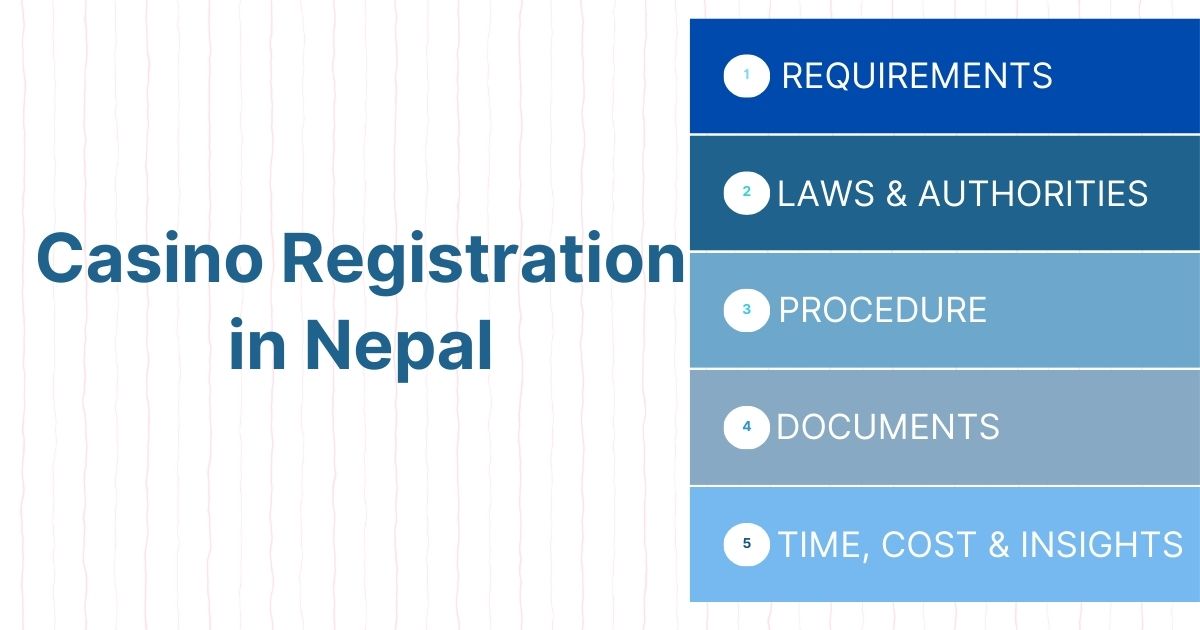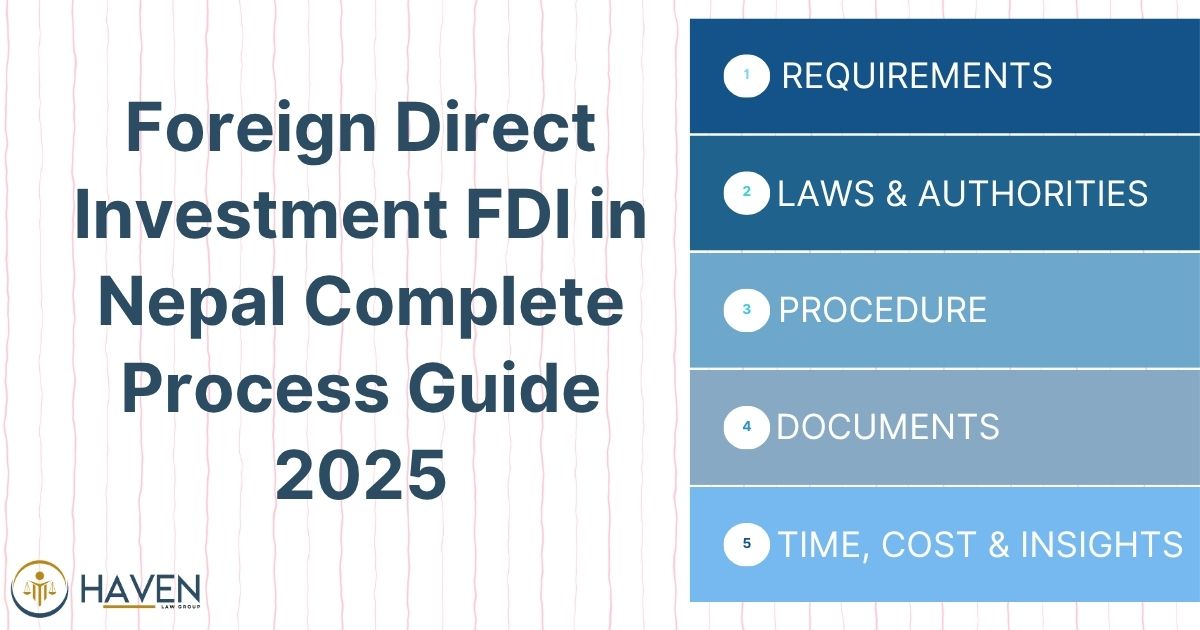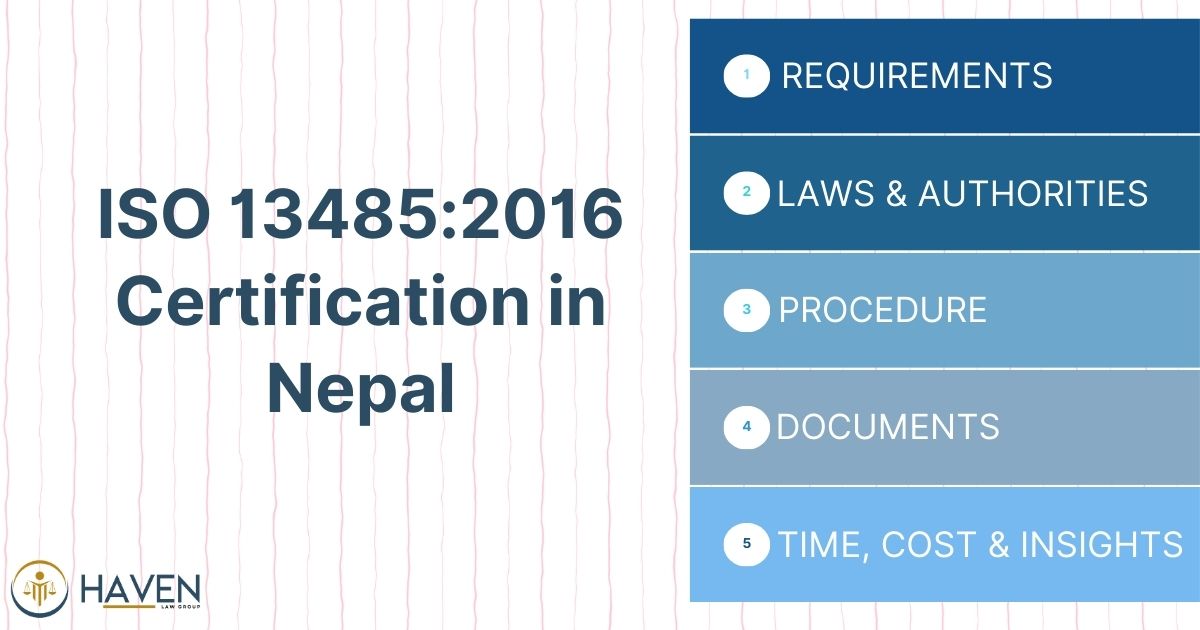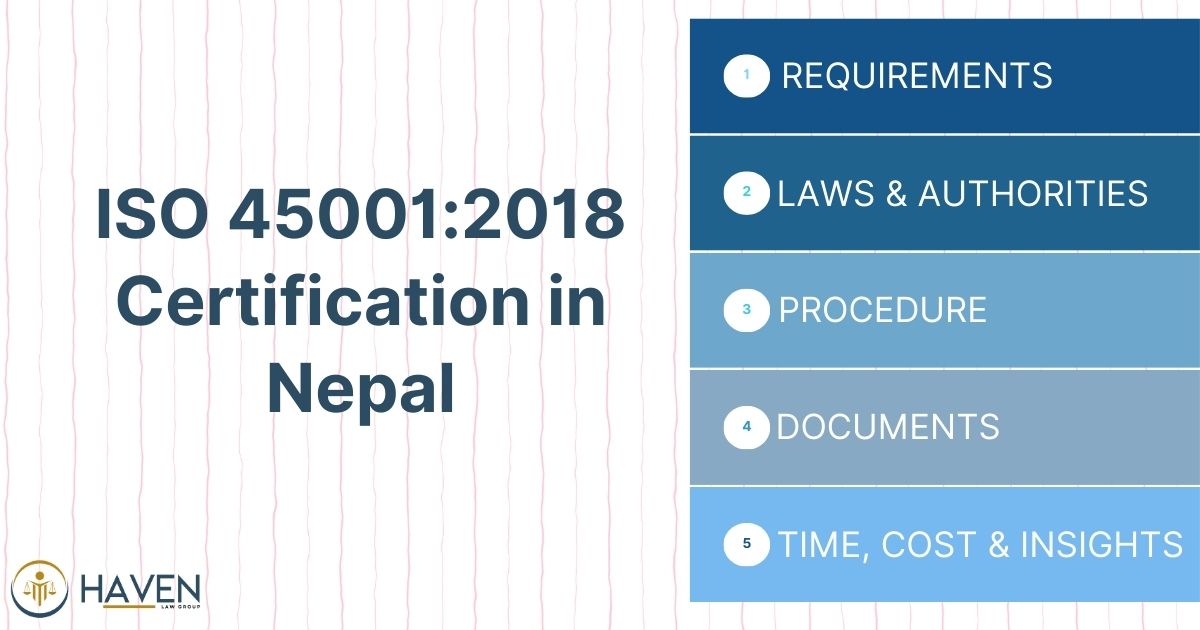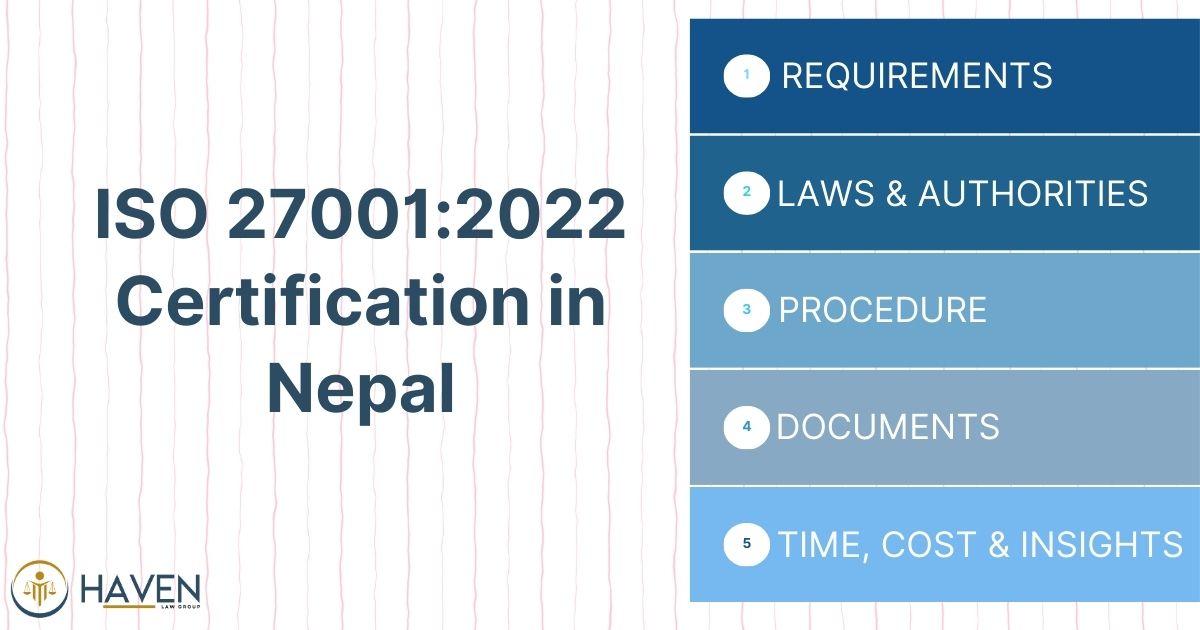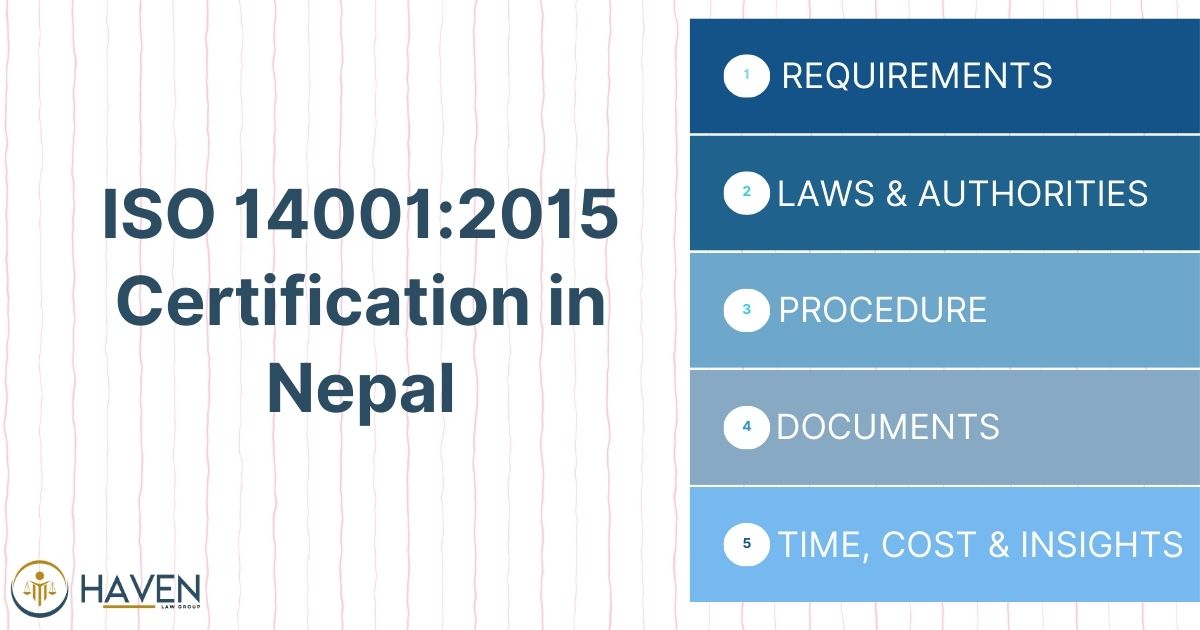What is a power of attorney in Nepal?
A power of attorney in Nepal is a legal document that authorizes an individual or entity to act on behalf of another person in specified legal or financial matters. This legal instrument, recognized under Nepali law, allows the appointed person (the attorney-in-fact) to make decisions and take actions for the person granting the power (the principal). The power of attorney can cover a wide range of responsibilities, from managing financial affairs to making healthcare decisions.
In Nepal, the concept is governed by the Muluki Civil Code, 2074 (2017), which outlines the legal framework for creating and executing powers of attorney. This document is particularly useful when the principal is unable to handle their affairs due to illness, absence, or other circumstances.
Who can issue a power of attorney?
In Nepal, any adult of sound mind can issue a power of attorney. The legal requirements for issuing a power of attorney include:
- The principal must be at least 18 years old
- The principal must have the mental capacity to understand the nature and consequences of granting power of attorney
- The principal must be acting voluntarily, without coercion or undue influence
- The principal must be legally competent to enter into contracts
The Muluki Civil Code, 2074 (2017) stipulates that individuals under guardianship or those declared mentally incompetent by a court cannot issue a power of attorney. It’s essential that the principal fully comprehends the scope and implications of the powers they are granting to ensure the validity of the document.
Can NRNs issue power of attorney in Nepal?
Non-Resident Nepalis (NRNs) can issue power of attorney in Nepal, subject to certain conditions and procedures. The process for NRNs to issue a power of attorney involves:
- Preparing the power of attorney document in Nepali or English
- Having the document notarized by a local notary public in their country of residence
- Getting the document authenticated by the Nepali embassy or consulate in that country
- Submitting the authenticated document to the relevant authorities in Nepal
NRNs must ensure that the power of attorney complies with both Nepali law and the laws of their country of residence. The Non-Resident Nepali Act, 2064 (2008) recognizes the rights of NRNs to conduct various legal and financial transactions in Nepal, including the issuance of power of attorney. However, NRNs should be aware of any specific restrictions or requirements that may apply to their particular situation.
What are the types of power of attorney in Nepal?
Nepal recognizes several types of power of attorney, each serving different purposes:
- General Power of Attorney: Grants broad authority to the attorney-in-fact to handle various legal and financial matters on behalf of the principal.
- Special Power of Attorney: Authorizes the attorney-in-fact to perform specific tasks or transactions, such as selling a property or managing a particular business deal.
- Durable Power of Attorney: Remains in effect even if the principal becomes incapacitated or unable to make decisions.
- Limited Power of Attorney: Grants authority for a specific period or for a particular transaction.
- Healthcare Power of Attorney: Allows the attorney-in-fact to make medical decisions on behalf of the principal if they become incapacitated.
The Muluki Civil Code, 2074 (2017) provides the legal framework for these different types of power of attorney, outlining the scope and limitations of each. The choice of power of attorney depends on the principal’s specific needs and circumstances.
What documents are required to issue power of attorney?
To issue a power of attorney in Nepal, the following documents are typically required:
- Citizenship certificate or passport of the principal
- Citizenship certificate or passport of the attorney-in-fact
- Recent photographs of both the principal and the attorney-in-fact
- Proof of relationship between the principal and the attorney-in-fact (if applicable)
- Property ownership documents (for property-related powers of attorney)
- Medical certificate (for healthcare power of attorney)
- Notarized power of attorney document
The exact requirements may vary depending on the type of power of attorney and the specific circumstances. It’s advisable to consult with a legal professional or the relevant government office to ensure all necessary documents are prepared and submitted correctly.
Can power of attorney be revoked in Nepal?
Yes, a power of attorney can be revoked in Nepal. The principal has the right to revoke the power of attorney at any time, provided they have the mental capacity to do so. The revocation process typically involves:
- Preparing a written revocation document
- Notarizing the revocation document
- Informing the attorney-in-fact of the revocation
- Notifying any third parties or institutions that were dealing with the attorney-in-fact
- Filing the revocation with the relevant authorities, if the original power of attorney was registered
The Muluki Civil Code, 2074 (2017) recognizes the principal’s right to revoke a power of attorney. However, it’s important to note that any actions taken by the attorney-in-fact before being notified of the revocation are generally considered valid. Proper documentation and notification are crucial to ensure the effectiveness of the revocation.
Is notarization mandatory for power of attorney?
Notarization is mandatory for power of attorney documents in Nepal. The notarization process serves several purposes:
- Verifies the identity of the principal
- Confirms that the principal is signing the document voluntarily
- Ensures that the principal understands the contents and implications of the document
- Adds legal weight to the document, making it more difficult to challenge its authenticity
The notarization must be done by a licensed notary public in Nepal. For power of attorney documents executed outside Nepal, they must be notarized by a local notary and then authenticated by the Nepali embassy or consulate in that country. The Notary Public Act, 2063 (2006) governs the notarization process in Nepal, outlining the requirements and procedures for notarizing legal documents, including powers of attorney.
Can property transactions be done via power of attorney?
Property transactions can be conducted via power of attorney in Nepal, subject to certain conditions and limitations. The power of attorney must explicitly grant the authority to handle property transactions. Key points to consider include:
- The power of attorney must be specific about the property and the type of transaction authorized
- It must be properly notarized and registered with the relevant land revenue office
- The attorney-in-fact must comply with all legal requirements for property transactions
- Some transactions may require additional documentation or approvals
The Land Revenue Act, 2034 (1978) and the Land Act, 2021 (1964) govern property transactions in Nepal, including those conducted through power of attorney. It’s important to note that while property transactions via power of attorney are legally recognized, some institutions or individuals may be hesitant to accept them due to the risk of fraud. Therefore, it’s advisable to consult with a legal professional to ensure all necessary precautions are taken.
Are power of attorney fees applicable?
Yes, fees are applicable for power of attorney processes in Nepal. These fees may include:
- Notarization fees
- Document preparation fees (if prepared by a lawyer)
- Registration fees (if the power of attorney needs to be registered)
- Authentication fees (for documents notarized outside Nepal)
- Translation fees (if the document needs to be translated)
The exact fees can vary depending on the type of power of attorney, the complexity of the document, and the specific requirements of the case. It’s important to note that government fees are subject to change, and additional costs may be incurred for specialized services or expedited processing. The Fee Act, 2048 (1991) provides the legal basis for various government fees in Nepal, including those related to legal document processing.
Can power of attorney be contested in Nepal?
Power of attorney can be contested in Nepal under certain circumstances. Grounds for contesting a power of attorney may include:
- Lack of mental capacity of the principal at the time of execution
- Undue influence or coercion in the creation of the document
- Fraud or misrepresentation
- Improper execution or notarization
- Expiration or revocation of the power of attorney
The process of contesting a power of attorney typically involves filing a case in the appropriate court. The burden of proof generally lies with the party contesting the document. The Muluki Civil Code, 2074 (2017) and the Muluki Civil Procedure Code, 2074 (2017) provide the legal framework for contesting legal documents, including powers of attorney. It’s advisable to seek legal counsel if considering contesting a power of attorney, as the process can be complex and time-consuming.
How long is a power of attorney valid in Nepal?
The validity period of a power of attorney in Nepal depends on the type of power of attorney and the specific terms outlined in the document. Generally:
- A general power of attorney remains valid until revoked by the principal or terminated by law
- A special power of attorney is valid for the duration specified in the document or until the specific task is completed
- A durable power of attorney remains in effect even if the principal becomes incapacitated, unless revoked or terminated by court order
- A limited power of attorney is valid for the specific time period or until the particular transaction is completed
The Muluki Civil Code, 2074 (2017) allows for flexibility in determining the duration of a power of attorney, but it’s crucial that the validity period is clearly stated in the document. If no specific duration is mentioned, the power of attorney is generally considered valid until revoked or terminated by other means.
Can lawyers draft power of attorney documents?
Lawyers in Nepal can draft power of attorney documents. In fact, it’s often advisable to have a lawyer prepare or review a power of attorney to ensure:
- The document complies with all legal requirements
- The language is clear and unambiguous
- The scope of authority is accurately defined
- Any specific conditions or limitations are properly included
- The document addresses all relevant legal and practical considerations
The Nepal Bar Council Act, 2050 (1993) regulates the legal profession in Nepal, allowing licensed attorneys to provide legal services, including drafting legal documents such as powers of attorney. While it’s not mandatory to use a lawyer for creating a power of attorney, their expertise can help avoid potential issues and ensure the document effectively serves its intended purpose.
FAQs
1. Is notarization required?
Yes, notarization is required for power of attorney documents in Nepal. A licensed notary public must verify the identity of the principal and witness the signing of the document.
2. Can NRNs use it?
Yes, Non-Resident Nepalis (NRNs) can use power of attorney in Nepal. However, they must follow specific procedures for authentication through Nepali embassies or consulates in their country of residence.
3. Are fees applicable?
Yes, fees are applicable for power of attorney processes in Nepal. These may include notarization fees, registration fees, and document preparation fees, among others.
4. Is it revocable?
Yes, a power of attorney is revocable in Nepal. The principal can revoke the power of attorney at any time, provided they have the mental capacity to do so.
5. Can it be contested?
Yes, a power of attorney can be contested in Nepal on grounds such as lack of mental capacity, undue influence, fraud, or improper execution. The contestation process typically involves filing a case in court.
What is a Power of Attorney (POA) in Nepal?
A Power of Attorney in Nepal is a legal document authorizing someone to act on behalf of another person in specified matters, such as financial or property transactions.
What are the types of Power of Attorney in Nepal?
Nepal recognizes two main types: General Power of Attorney (broad authority) and Special Power of Attorney (limited to specific tasks or transactions).
When do I need a Power of Attorney in Nepal?
A Power of Attorney is needed when you cannot personally handle legal, financial, or property matters due to absence, illness, or other reasons.
Can a Power of Attorney be used for selling land or property in Nepal?
Yes, a properly drafted and registered Power of Attorney can be used for selling land or property in Nepal, subject to legal requirements.
What documents are required to issue a Power of Attorney in Nepal?
Required documents typically include identification proof, photographs, property documents (if applicable), and the draft Power of Attorney deed.
How do I draft a Power of Attorney in Nepal?
To draft a Power of Attorney in Nepal, consult a lawyer, clearly state the powers granted, include personal details, and follow proper legal formatting.
